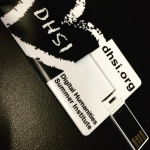Do you want to learn a new software, technology, or digital methodology? The Digital Humanities Summer Institute (DHSI) may be right for you! DHSI is a workshop hosted at the University of Victoria each summer. The courses are taught by internationally recognized scholars from various backgrounds such as English, Computer Science, and Library Sciences. Though the courses are not graded (cheers for GPA concerns!), participants leave with a certificate, which can be a great addition to a resume, cv, or portfolio. There are over 50 workshops offered over the course of two weeks (session 1 & 2). Some course examples include:
- Modelling. Virtual. Realities. A Practical Introduction to Virtual (and Augmented) Reality
- Digital Games as Tools for Scholarly Research, Communication and Pedagogy
- Feminist Digital Humanities: Theoretical, Social, and Material Engagements
Participants in each course include faculty, staff, students, and community practitioners. This means that classes are inclusive and designed for people who are different technical proficiencies. DHSI can be a great way to become more familiar with digital practices and methodologies, even if you do not consider yourself “digitally savvy.” Since our partnership with DHSI in 2015, various members of the TCU community have attended DHSI from staff members to graduate students to department chairs. Learn more about their experiences below.
Whitney Lew James (Rhet/Comp PhD Candidate)
DHSI 2017 Course: Digital Public Humanities
Before learning about DHSI, I would never have described myself as a “digital humanist,” but the Institute had so many amazing classes that I couldn’t resist applying. I chose the Digital Public Humanities course because it appealed to my interests in community literacy and digital composing. Throughout the week I learned about incredible projects taking place across the country and the globe that continue to inspire my work. The community of DHSI is incredible and brings together people from across higher education and the world.
Kassia Waggoner (Rhet/Comp PhD graduate)
DHSI 2015 Course: Feminist Digital Humanities: Theoretical, Social, and Material Engagements
My experience at DHSI 2015 was an invaluable experience that expanded my knowledge of several areas of digital humanities (e-literature, coding, theory, etc.) that I am now able to apply in my classroom and research practices. I am extremely grateful to the New Media Writing Studio for this opportunity and would encourage others to apply for this scholarship.
Dr. Sarah Robbins (English Faculty Member)
DHSI 2014 Course: Online Collaborative Scholarship: Principles and Practices (A CWRCShop)
I will describe my experience at DHSI 2014—a multi-faceted opportunity to learn about collaborative work in the digital humanities. The course I took was facilitated by a team affiliated with the Canadian Writing Research Collaborative (CWRC) project, whose website describes itself as “an online project designed to enable unprecedented avenues for studying the words that most move people in and about Canada.”
At DHSI, the course focused not so much on the content of the CWRC (i.e., Canadian culture) as on the strategies embedded in its online operations to support collaborative archive-building. Because the course also had an unadvertised agenda of recruiting new members for the CWRC community, it was at times less helpful than I anticipated around its stated goal of “exploring possibilities for collaboration throughout the entire scholarly workflow, with an emphasis on leveraging computers to assist with the collaborative process.” However, the camaraderie among all workshop participants was inspiring, and watching the course leaders struggle every day with various elements in their online materials was inspiring, in that it offered a reminder that digital humanities work must be open to challenges—indeed, must impress “snafus” as normal.
Beyond the course, as my contribution to the NMWS session will emphasize, other avenues at the institute were at least—if not more—fruitful that the course. These included lunchtime “birds of a feather” sessions with engaging topics and outstanding plenary speakers. DHSI for me, overall, was energizing and enabling, as I’ll share in my part of this group presentation.
Joanna Schmidt (Koehler Center staff)
DHSI 2014 Course: Text Encoding Fundamentals and their Application
This year was my third year at DHSI, and I finally had the opportunity to take Text Encoding Fundamentals. Although I had taken more advanced and interest-specific courses in past summers, learning the basics of TEI provided me with a stronger understanding of the unseen structure many Digital Humanities projects are built upon. It is also a skill set that wasn’t available to me during my own coursework or through faculty at TCU. As I spent a week struggling over TEI complexities with other junior and advanced scholars from around the world and across disciplines, the course gave us new ways to discuss how knowledge is made in other fields and how our work might be complementary. It embodies the goals I now hear about working in the Koehler Center: to break down academic silos, to do more collaborative work, and to share academic work more widely.
I hope anyone who holds similar goals and has an interest in shaping and crossing the boundaries of scholarship and technology has a chance to attend DHSI and represent TCU.
Tyler Branson (Rhet/Comp PhD graduate)
DHSI 2014 Course: Data, Math, Visualization, and Interpretation of Networks: An Introduction
I was reluctant to apply to DHSI because I didn’t technically consider myself a digital humanist, and, as a rhetoric/composition person, I wasn’t sure if my research interests would align much with scholars who are typically oriented toward literary studies. And while it was certainly true that the work done at DHSI was much different than my own, it is also true that this experience couldn’t have been more productive for me. By placing myself in an intellectually uncomfortable environment, I was able to meet new people doing really innovative work vastly different from my own, and I was able to learn from them, find unanticipated connections to my own work, and more importantly, learn about the varied and important work going on in the digital humanities that I wouldn’t have otherwise considered.
Ultimately, what I took away was that being a digital humanist isn’t necessarily about becoming an expert in both your own specialty and digital/computational methods, but rather, learning to collaborate with people who know more than you, sharing your own expertise with them, and gaining new skills through that collaborative exchange. The diversity of ideas, methods, scholarship, and disciplinary orientations at DHSI is truly inspiring, and I recommend the conference to anyone with a remote interest in technology studies, at any skill level, and from any humanities-based field.

The DHSI Colloquium is a small conference held between the two course sessions (week 1 and week 2). Anyone, even those new to digital humanities, are welcome to submit proposals for full-length presentations (20 minutes), short presentations (5-10 minutes), and posters/digital demonstrations. Proposals can cover any topic broadly related to digital humanities such as:
- Your role in research projects involving technology
- Perspectives on digital humanity concepts or methods from your own research and pedagogy
- Reports on activities from the field (for example: the use of technology in activism or the workplace)
- Snapshots of digital humanity subfields (such as the intersection of Latinx Studies and Mapping Software or Feminism and Virtual Reality)
Aside from the opportunity to present your ideas, the Colloquium can be a great way to network and hear from other scholars outside of your course. Additionally, some funding sources such as TCU’s Graduate Student Travel Grant require a speaker role (a presentation of at least 15 minutes) to qualify for funding. We encourage all participants to reach out to their advisors or those in charge of travel funds to find out if they require presentations. Please refer to DHSI’s website for further details on applying.
The Center for Digital Expression has an institutional sponsorship for Digital Humanities Summer Institute. Included as part of our sponsorship is five tuition waivers and unlimited 50% tuition reductions. Any member of the TCU community is encouraged to apply for the scholarship which covers the registration costs for a week-long workshop. Priority is given for first time DHSI attendees, graduate students, and those from AddRan College. We will create a waiting list for other applicants.
In addition to the cost of registration, the workshop has other expenses such as flights, accommodations, transportation and food. While costs vary for each participant, DHSI tends to cost on average $1000-1200. Depending on department and institutional status, the available funding may vary. In addition to the scholarship waiver, CDEx has a Microgrant Program which offers up to $300 in assistance.
Undergraduates are encouraged to reach out to their advisors and departments about available funding. All graduate students are eligible to apply for a Graduate Student Travel Grant, which covers up to $800 for international travel. In addition to departmental travel funds, most graduate students are able to attend DHSI without having out-of-pocket expenses.
Learn more about the costs and benefits of DHSI from TCU graduate student, Jongkeyong Kim, who has attended DHSI for three summer sessions:
*The cost estimates are pre-pandemic. DSHI was virtual for 2020-22.
If you are concerned about the costs of DHSI attendance or unsure of how to apply for funding please reach out to CDEx via email at cdex@tcu.edu. We are committed to making tech education as accessible and affordable as possible.
As part of our partnership, CDEx has 5 tuition waivers. Priority is given to the following: first time DHSI attendees, graduate students, and those from AddRan College. We will create a waiting list for other applicants.
Questions? Email us at cdex@tcu.edu with questions or to make an appointment with Director Curt Rode or Assistant Director Kit Snyder.

Interested in Digital Work?
Join other TCU faculty/staff/students in Victoria, CA this summer.